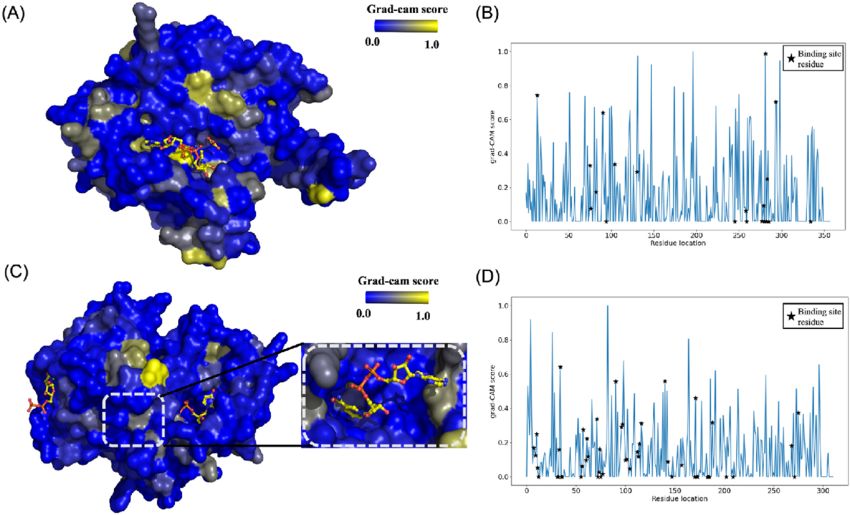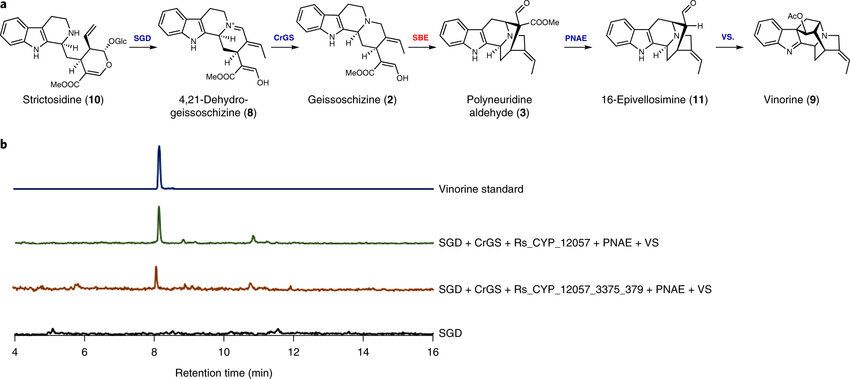Our Custom Enzyme Candidates Screening is a specialized service designed to expedite the discovery of promising enzymes for a variety of applications in fields like biotechnology and pharmaceuticals. This service is crucial as it provides a streamlined approach to enzyme discovery, conserving both time and resources. The primary goal of this service is to sift through a multitude of enzymes and narrow down the selection to a few that show the greatest potential for a specific application.
 Grad-CAM results for two top enzyme candidates in reaction rules R1 and R2 (Vikas Upadhyay, et al., 2023)
Grad-CAM results for two top enzyme candidates in reaction rules R1 and R2 (Vikas Upadhyay, et al., 2023)
Service Process
In this section, we will detail the comprehensive process involved in our Custom Enzyme Candidates Screening service. This specialized service is designed to assist in the identification and evaluation of potential enzyme candidates, and we follow a meticulous series of steps to ensure the highest level of accuracy and efficiency.
- Initial Consultation: Our Custom Enzyme Candidates Screening service starts with a consultation. In this stage, we strive to understand customers' specific needs, objectives, and potential enzyme applications. This crucial step enables us to customize our screening process to suit your unique needs.
- Designing and Executing the Custom Screening Process: Using the information obtained from the consultation, we design and execute a personalized screening process. This involves a thorough evaluation of potential enzyme candidates based on their unique properties and performance, such as activity, stability, and compatibility with various conditions.
- Analyzing the Results: After completing the screening process, we meticulously analyze the results. Our expert team evaluates each enzyme candidate's performance, considering their screening results and potential suitability for specific applications.
- Reporting: Finally, we compile a comprehensive report summarizing our findings. This report includes a thorough overview of the screening process, a detailed explanation of the results, and clear recommendations for next steps based on these findings. The report's purpose is to provide clear and concise information about potential enzyme candidates to facilitate informed decisions for further examination and potential commercial use.
We're here to assist you. If you have any questions, need more information, or would like to discuss a potential project, please don't hesitate to contact us. Our team is always eager to help and share our expertise.
Applications
| Application |
Description |
| Drug Discovery |
Enzyme candidates screening is pivotal in drug discovery, facilitating the identification and validation of potential drug targets and therapeutic agents. Through high-throughput screening techniques, enzymes are evaluated for their interactions with small molecules or compounds to identify lead compounds for further development into novel drugs. Enzyme screening also aids in understanding disease mechanisms and designing targeted therapies for various medical conditions. |
| Biotechnology |
Enzyme candidates screening plays a crucial role in biotechnology for the development of enzymes with desired properties for industrial and research applications. Enzymes are screened and engineered for specific functions, such as protein synthesis, DNA amplification, or biocatalysis, enabling advancements in fields like biopharmaceutical manufacturing, biofuel production, and bioremediation. Enzyme screening accelerates the discovery and optimization of enzyme-based processes, enhancing efficiency and sustainability in biotechnological industries. |
| Enzyme Engineering |
Enzyme candidates screening is fundamental in enzyme engineering, aiding in the development of tailor-made enzymes with enhanced properties such as substrate specificity, stability, and catalytic efficiency. Through techniques like directed evolution and rational design, enzymes are screened for desired traits, enabling the creation of biocatalysts for industrial processes, synthetic biology applications, and biomedical research. Enzyme screening accelerates the optimization of enzyme performance, facilitating their integration into various biotechnological and pharmaceutical processes. |
| Industrial Biocatalysis |
Enzyme candidates screening is integral to industrial biocatalysis for identifying enzymes suitable for catalyzing specific chemical reactions under industrial conditions. Enzymes are screened for their substrate specificity, catalytic activity, and tolerance to harsh reaction conditions, enabling their utilization in diverse industrial processes such as pharmaceutical synthesis, fine chemicals production, and bio-based materials manufacturing. Enzyme screening accelerates the development of sustainable and cost-effective biocatalytic processes, reducing reliance on traditional chemical catalysts and minimizing environmental impact. |
| Diagnostic Assays |
Enzyme candidates screening is essential in the development of diagnostic assays for the detection and quantification of biomolecules in clinical, environmental, and research settings. Enzymes serve as detection labels, amplification agents, or signal generators in various diagnostic techniques such as enzyme-linked immunosorbent assays (ELISA), polymerase chain reaction (PCR), and enzymatic biosensors. Enzyme screening facilitates the selection of enzymes with optimal performance characteristics, ensuring the sensitivity, specificity, and reliability of diagnostic tests for applications ranging from disease diagnosis to environmental monitoring. |
| Agricultural Biotechnology |
Enzyme candidates screening is employed in agricultural biotechnology to discover enzymes involved in plant-microbe interactions, nutrient cycling, and stress response mechanisms. Enzymes are screened for their roles in improving crop resilience, nutrient uptake efficiency, and disease resistance, offering potential solutions for sustainable agriculture and food security. Enzyme screening also aids in the development of bio-fertilizers, bio-stimulants, and plant growth-promoting agents, contributing to enhanced agricultural productivity and environmental sustainability. |
Case Study
The figure below illustrates the screening of Sarpagan bridge enzyme candidates through combinatorial expression in N. benthamiana. (a) Biosynthetic pathway from strictosidine to the sarpagan alkaloid vinorine. 4,21-Dehydrogeissoschizine is an isomer of strictosidine aglycone. (b) Reconstitution of the biosynthetic pathway to vinorine from strictosidine in N. benthamiana to identify SBE. Multiple-reaction-monitoring (MRM) chromatograms showing in planta catalytic activity of Rs_CYP_12057 in combination with strictosidine substrate and other known enzymes to produce vinorine (SGD + CrGS + Rs_CYP_12057 + Rs_CYP_3375 + Rs_CYP_379 + PNAE + VS and SGD + CrGS + Rs_CYP_12057 + PNAE + VS) compared to the negative control.
 Sarpagan bridge enzyme has substrate-controlled cyclization and aromatization modes (Thu Thuy Thi D., et al., 2018)
Sarpagan bridge enzyme has substrate-controlled cyclization and aromatization modes (Thu Thuy Thi D., et al., 2018)
FAQs
Below is a set of Frequently Asked Questions (FAQs) that provide a detailed overview of our Custom Enzyme Candidates Screening service, its importance, and how it operates. If you have more specific or detailed questions, don't hesitate to get in touch with us directly.
Q: What does Enzyme Candidates Screening entail?
A: Enzyme Candidates Screening is a methodical process that we utilize to pinpoint potential enzymes that could be beneficial for applications. This process involves a comprehensive evaluation of enzymes, scrutinizing them based on their distinctive properties and performance. We consider factors such as their activity, stability, and compatibility with different conditions to determine their suitability for specific applications.
Q: Can you elaborate on why Custom Enzyme Candidates Screening is needed?
A: Custom Enzyme Candidates Screening is vital because it paves the way for a more targeted approach to enzyme discovery. This service aims to identify the most promising enzyme candidates for further examination and possible commercial application, thus conserving resources and speeding up the discovery and development process. Without this service, the discovery process could be significantly hampered, leading to wasted resources and delays in bringing potential products to market.
Q: How does your Custom Enzyme Candidates Screening process operate?
A: Our screening process is extensive and follows several important stages. Initially, we hold a consultation to comprehend your specific needs and goals. Based on this understanding, we design and run a tailor-made screening process. This process involves assessing a large number of enzymes and narrowing down the candidates based on predefined criteria. Once the screening process has concluded, we carry out a detailed analysis of the results. We then compile a comprehensive report that outlines our findings, providing you with clear and concise information about potential enzyme candidates.
Q: How do you decide which enzymes to screen?
A: The enzymes we screen are selected based on your specific needs and the potential application of the enzymes. We consider factors such as the desired reaction, the conditions under which the enzyme is expected to operate, and any other specific requirements you may have.
Q: How long does the Custom Enzyme Candidates Screening process take?
A: The duration of the screening process can vary depending on the number of enzymes being screened and the complexity of the criteria for selection. We always strive to complete the process in a timely manner while ensuring accuracy and thoroughness.
Q: How are the results of the screening process presented?
A: The results of the screening process are presented in a comprehensive report. This report includes a detailed overview of the screening process, a thorough explanation of the results, and clear recommendations for further action based on our findings.
Q: Can you accommodate large-scale screening projects?
A: Yes, we are fully equipped to handle large-scale screening projects. Our team has the capacity and the expertise to manage large volumes of samples and to process them efficiently and accurately.
Q: Can you handle urgent screening requests?
A: We understand that time is often of the essence in research and development. While our screening process is thorough and requires sufficient time to ensure accuracy, we do our best to accommodate urgent requests whenever possible.
Q: How can I get started with your Custom Enzyme Candidates Screening service?
A: Getting started with our service is simple. You just need to get in touch with us to schedule an initial consultation. During this consultation, we will discuss your needs and objectives and outline how our screening service can assist you.

































 Grad-CAM results for two top enzyme candidates in reaction rules R1 and R2 (Vikas Upadhyay, et al., 2023)
Grad-CAM results for two top enzyme candidates in reaction rules R1 and R2 (Vikas Upadhyay, et al., 2023) Sarpagan bridge enzyme has substrate-controlled cyclization and aromatization modes (Thu Thuy Thi D., et al., 2018)
Sarpagan bridge enzyme has substrate-controlled cyclization and aromatization modes (Thu Thuy Thi D., et al., 2018)